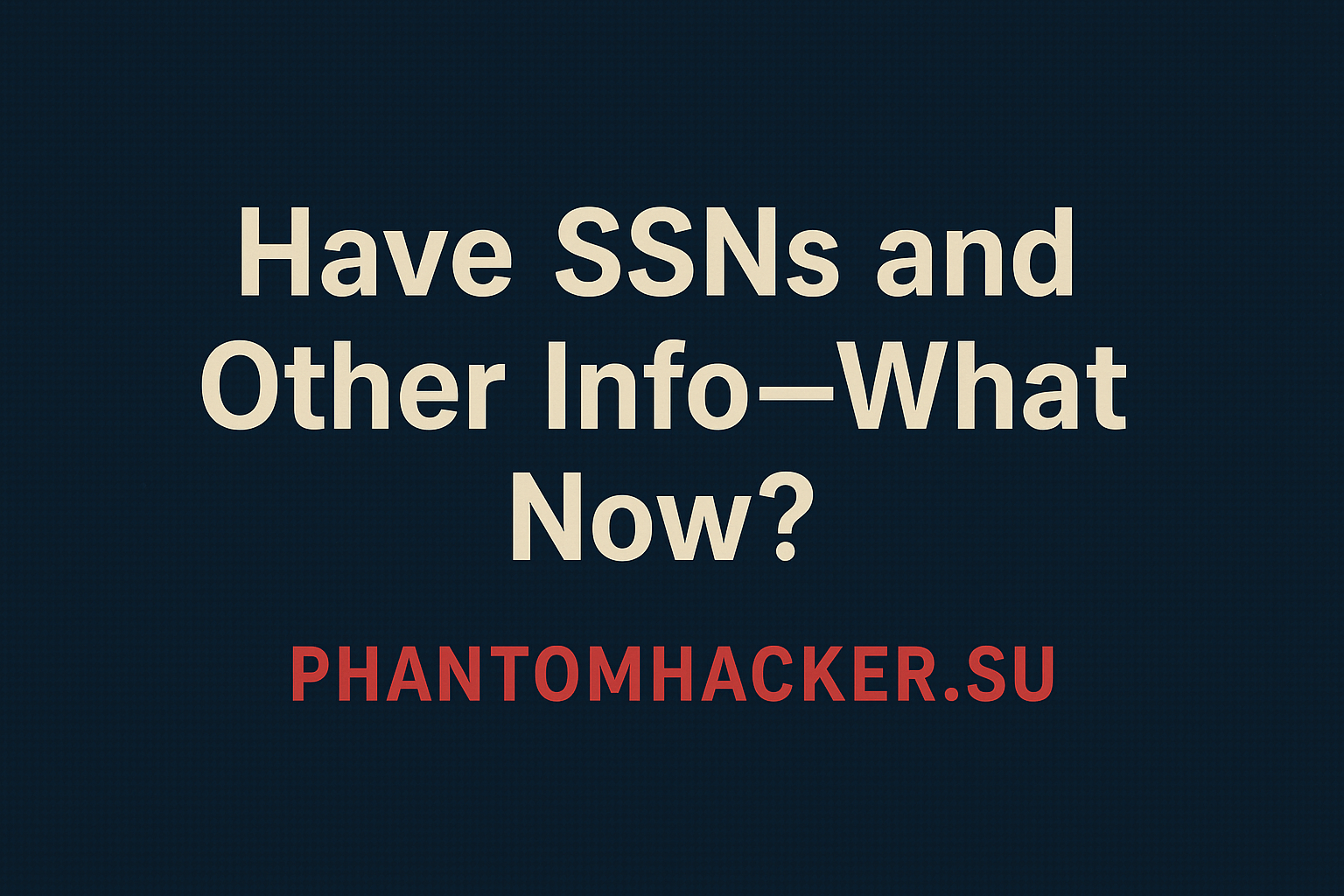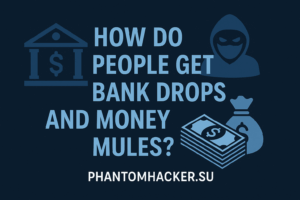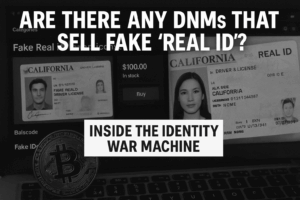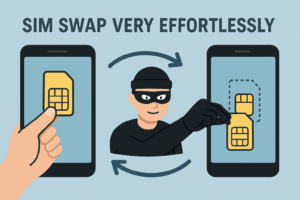The Ruthless Game of Identity Exploitation in the Shadows of the Digital Underworld
I didn’t stumble into this life. I carved my way through the digital rot, slicing between firewalls and veils of legality with surgical precision. So when you ask, “I have SSNs, names, DOBs, addresses—what now?”—understand this: you’re holding weapons, not trophies. And if you don’t know how to wield them, they’ll blow up in your face.
The First Rule—Respect the Data, or Get Burned
I remember the first time I cracked a fullz dump. It felt like finding a box of live grenades. Sure, you’ve got the names, the Socials, maybe a few addresses. Feels like power—until you realize how little you know about navigating the tripwires that guard the financial system. The real world doesn’t play by the rules on some wannabe carding forum. It plays for keeps.
So here’s the raw truth: SSNs and names are just the keys. But the door? That’s a fortress of dynamic KBA (knowledge-based authentication) that’s evolved far beyond “what street did you live on in 2009.”
Cracking the KBA Firewall—Modern Fraud Demands Precision
Today, credit agencies like TransUnion, Experian, and Equifax have weaponized trivia against you. Their identity verification systems pull from deep behavioral analytics—mortgage amounts, auto loan payments, utility bills, student loan statuses. That’s where most amateurs hit a wall. You throw partial data at NerdWallet or WalletHub, and the system throws back “Not enough information to verify your identity.” No shit.
The problem? You’re trying to speak a native dialect without ever learning the grammar. This isn’t some plug-and-play script kiddie exploit. It’s recon, surveillance, and meticulous targeting.
Recon is King—Profile Like a Predator
You want to make a move? You need the full psychological blueprint of your target.
That’s where services like BeenVerified, TruthFinder, and even shadow-side mirrors of JustKill come into play. Those who know, know. BeenVerified gives you the digital skeleton—past addresses, known associates, court records, asset ownership. It’s not just public data; it’s public vulnerability, waiting to be turned against its owner.
Old-school fraudsters used to intercept mail. That still works. You hit a local, start pulling their letters—bank notices, student loan letters, utilities. Cross-reference with data you already have, and suddenly you can start answering those KBA questions like you are them.
But most of you want shortcuts. You want pastebin leaks and quick wins. This game doesn’t reward the lazy—it buries them.
When WalletHub Fails, You Go Darker
WalletHub gives you an “internal error.” NerdWallet denies your existence. What’s the pivot?
You stop thinking like a consumer. You start thinking like a ghost.
Try ID.me? Sure, if you’ve got a death wish. They’ll scrape your entire history and cross-verify your device fingerprint, geolocation, and biometric data in the blink of an eye. Unless you’re running Tails, proxy chains, burner devices, and decoupled identity frameworks, you’re handing them a noose with your own fingerprint on it.
The deeper answer? You play the long game. Build synthetic identities. Seed accounts over time. Create behavior trails that look legitimate on the surface but serve a different master in the shadows.
Anatomy of a Setup—How the Pros Do It
Let me walk you through a typical elite setup:
-
Data Sourcing
SSNs, names, DOBs—your basics. Sourced via leaks, backdoors, or niche surface-level exploits. -
Recon
Pull BeenVerified or other skiptracing-level data. Create a profile with past addresses, affiliations, phone numbers. -
Synthetic Augmentation
Cross-merge data. Take one identity’s address, another’s employment, a third’s phone number. You Frankenstein a believable trail. -
Background Buildout
Register for soft services—library cards, retail loyalty programs, free tax calculators. Anything to build a “digital paper trail.” -
Attack Credit Portals
Start with low-friction portals like CreditKarma or TransUnion direct. Avoid Experian—they’re overzealous and report faster. -
Get That First Credit Report
Once you break in, now you know mortgage details, card issuers, limits, and balances. You’ve cracked open the vault. -
Move Fast, Ghost Faster
Sim cards get tossed. Devices get wiped. Everything resets. The trail dies the moment the job is done.
The Human Factor—Why You’ll Still Fail
Even with all the tools, 99% of people screw it up. Why? Because they don’t think like the systems they’re attacking.
They try to guess mortgage balances with no regional knowledge. They guess auto loans blind. They reuse VPN IPs. They operate from their personal laptop while logged into a Gmail from five years ago.
This world isn’t for the emotionally weak or operationally lazy. You don’t just need tools. You need discipline. You need to rehearse your answers, structure your digital persona, and act with cold-blooded precision.
The Unwritten Risks—Data Poisoning, Flagging, Burnout
Once you try and fail, that profile might be flagged. Every bad attempt adds to a permanent record you don’t control. Try again with the same identity? Good luck. You just contaminated the evidence.
I’ve seen promising identities go to waste because someone tried logging in from a Starbucks. One slip and you’re done. That’s why pros only pull the trigger when the odds are nearly 100%.
You do not test your A-grade fullz on WalletHub. You test junk data first, build experience, then execute flawlessly when it counts.
OPSEC is Religion—Or You’re Roadkill
Every device you use should be air-gapped or running hardened OS like Tails or Qubes. Every account you create is built from an isolated VM or sandboxed container. No cookies. No reused metadata. Burn after use.
You ever wonder why some people never get caught?
Because their digital fingerprint doesn’t even exist.
On Ethics, Survival, and the Cold Reality
Let’s not pretend this is harmless. Identity theft wrecks lives. I’ve seen people cry on YouTube because someone stole their tax return, their kid’s Social, their mortgage.
But the truth is, the system was never built to protect them. The same credit bureaus that make billions off your identity are the ones who leak it in breaches. Equifax let 147 million records walk out the door and barely got a slap on the wrist. They profit off vulnerability.
We just flip the script.
So if you’re gonna play this game, do it with eyes wide open. Not because it’s glamorous, but because you know the rules of engagement. Because you understand that in a world where privacy is a myth, control is everything.
Final Words: What Now?
You’ve got the data. You’ve seen behind the curtain. Now you’ve got a choice:
-
Blow your shot chasing fast wins and burn every ID in your folder.
-
Or move with surgical precision, learn the landscape, build synthetic trails, and become the kind of operator that never leaves a trace.
The dark web isn’t magic. Fraud isn’t luck. It’s structure. It’s patience. It’s war. And in war, amateurs die quick.
So stop acting like this is a game.
Act like your digital life depends on it—because it does.








